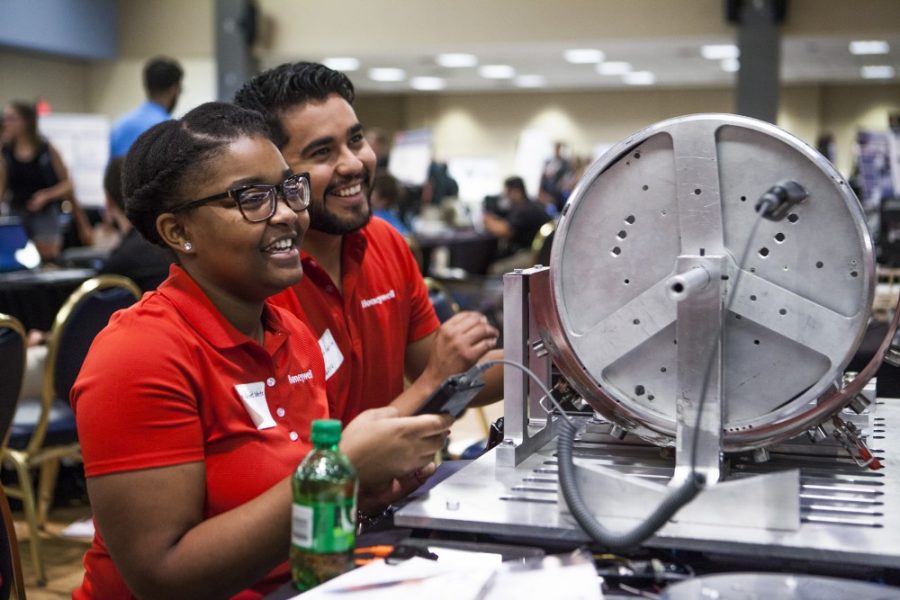The University of Arizona will host a national congress on Hispanics in STEM Nov. 18-20 after receiving one of four $100,000 awards from the National Science Foundation (NSF).
“This is an exciting award for the University of Arizona,” UA President Dr. Robert Robbins told UANews. “The UA is proud to serve the Hispanic students of Arizona and our region, and this grant will help ensure that we are creating an environment that enables their success in vital STEM fields. I can’t wait to see what comes out of this work.”
The conference will bring together leaders in education and STEM fields to discuss “the most critical challenges and opportunities regarding undergraduate STEM education at Hispanic Serving Institutions” in order to inform future NSF programs.
RELATED: Opinion: Women, pursue STEM out of passion, not pressure.
While UA’s main campus does not yet have standing as a full Hispanic Serving Institution, minority students make up half of new Arizona students, and the UA plans to apply for full HSi status this fall. An HSi is a not-for-profit institution in which 25 percent of undergraduates are Hispanic, according to the Higher Education Act.
Nevertheless, the UA has many programs that target Hispanic students and other minorities in STEM fields.

One of the programs, the Environmental Health Sciences Transformative Research Undergraduate Experience, prepares underrepresented minority and economically disadvantaged students for graduate schools and professional programs to study the impact of the environment on human health, according to Carol Bender, director of the Undergraduate Biology Research Program and Related Programs.
“Because minority and economically disadvantaged communities are disproportionately affected by environmental health hazards, it is important to train individuals from these communities, or who have a particular interest in these communities, on how to research and approach dealing with environmental health hazards,” Bender said.“Personally, I think engaging all people in STEM is important,” said mathematics professor William Velez, one of the grant writers. “When you look at minority populations, they have not, in general, participated in these areas.”
Nationally, Hispanics are the fastest growing population in the United States. Velez said he believes it is critical to target them in STEM, something he has undertaken in the mathematics department for the last 25 years.
“These are the careers of the future; people have to be more quantitative in their preparation in order to be able to address the many complex problems that face society,” Velez said.
Associate research scientist of mathematics Guadalupe Lozano led the team that brought the conference to the UA, which also includes Velez; Marla Franco, director of assessment and research; Vignesh Subbian, assistant professor of biomedical engineering; and Anna O’Leary, associate professor of Mexican-American studies.
 UA’s conference is the only one with a regional focus and will be divided into five tracks where participants will discuss specific categories of issues relating to the Hispanics in STEM and produce a report for the NSF.
UA’s conference is the only one with a regional focus and will be divided into five tracks where participants will discuss specific categories of issues relating to the Hispanics in STEM and produce a report for the NSF.
One of the five tracks will focus on integrating STEM research resources with the resources and goals of Hispanic Serving Institutions.
“Among Hispanic Serving Institutions, there are not many Research 1 institutions,” Lozano said. “The UA has the possibility to leverage the top-of-the-line research we do here with a specific eye toward defining our profile as a Hispanic Serving Institution.”
Lozano said the UA can use its regional collaborations to become the preeminent Hispanic Serving Institution in the state and create programs with two-year Hispanic Serving Institutions to promote research and increase the performance and persistence of transfer students.
Another conference track will address the many issues faced by students transitioning to four-year institutions and points of collaboration to address these problems between Hispanic Serving Institutions.
RELATED: Guest letter: Now is a great time for women to join STEM fields.
A third track will focus on “addressing cultural competencies and their particular importance in Hispanic Serving Institutions,” Lozano said.
This track will focus on “meeting students where they are” and has so far drawn the most interest from potential conference attendees, according to Lozano.
The other three institutions selected to host a conference on Hispanics in STEM are the University of Houston, the University of California at Irvine and Nova Southeastern University.
“The UA has really been at the forefront of many of these interests,” Velez said. “The fact that we are holding the conference here gives us an opportunity to give voice to the concerns that we have and express our views to the NSF from the local population.”
Follow Randall Eck on Twitter.














